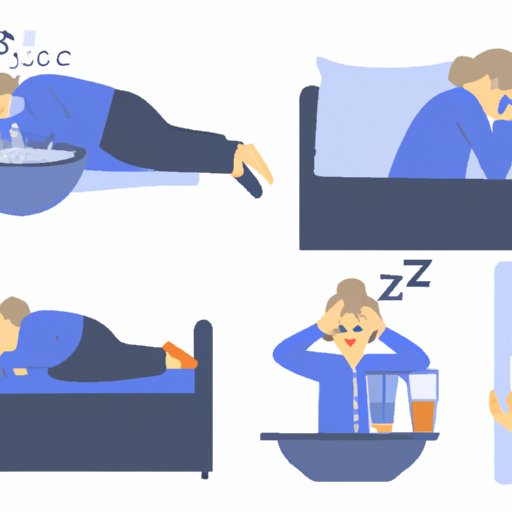
Introduction
Narcolepsy is a rare sleep disorder that affects approximately 1 in every 2,000 people. It is characterized by an irresistible urge to sleep and sudden bouts of sleep during the day, even in the midst of activities. Recognizing the symptoms of this disorder is crucial as it can significantly impact daily life and can lead to accidents and other adverse events. In this article, we will discuss the ten common symptoms of Narcolepsy and offer tips for managing them effectively.
10 Signs That You Could Be Suffering From Narcolepsy
Narcolepsy occurs when the brain cannot regulate sleep-wake cycles correctly, leading to sleep attacks and sudden bouts of sleepiness during the day. The ten most common symptoms of this disorder include:
- Excessive daytime sleepiness
- Sudden sleep attacks
- Cataplexy (sudden loss of muscle tone)
- Sleep paralysis
- Hallucinations during sleep or wakefulness
- Automatic behaviors
- Mental fog
- Insomnia
- Fragmented sleep patterns
- Feeling run-down or “not yourself”
Is Your Sleep Disorder Disrupting Your Life? Understanding the Symptoms of Narcolepsy
Narcolepsy is a lifelong condition that affects the brain’s ability to regulate sleep-wake cycles effectively. This disorder can be debilitating and have a significant impact on everyday life, including work, relationships, and daily activities. Some common symptoms of Narcolepsy include:
- Daytime sleepiness can occur at any time of the day, no matter how much sleep you have had the previous night.
- Sleep attacks represent an uncontrollable need to sleep, which can lead to dangerous situations like falling asleep while driving.
- Cataplexy occurs when emotions trigger muscle weakness or paralysis in the body, which can lead to falls or accidents.
- Sleep paralysis prevents the ability to move while waking up or falling asleep, which can be scary and frustrating.
- Hallucinations are seeing or hearing things that are not there and can occur during wakefulness or sleep.
- Automatic behaviors are when the body continues with motions like typing or driving, even when the mind is asleep.
- Mental fog and memory problems related to Narcolepsy can lead to difficulties with concentration, decision-making, and daily activities.
- Insomnia is a common symptom and can be caused by disrupted sleep cycles and frequent awakenings.
These symptoms can affect everyday life and make it difficult to function normally. They can lead to decreased productivity, irritability, depression, and anxiety if left untreated.
The Unpredictable Nature of Narcolepsy: Recognizing the Common Symptoms
Narcolepsy symptoms can occur at any time of the day, even during activities like driving or walking. They can be unpredictable and sudden, leading to accidents and other undesirable situations. Recognizing common symptoms is essential to manage this disorder effectively. Being aware of these symptoms can help you identify when and how to handle them. Early diagnosis and treatment will go a long way in managing this disorder and improving quality of life.
From Daytime Sleepiness to Sleep Paralysis: A Comprehensive Overview of Narcolepsy Symptoms
The effects of Narcolepsy on daily life come in various forms, including:
- Excessive daytime sleepiness
- Sleep attacks are sudden and uncontrollable episodes of sleep, regardless of circumstances.
- Cataplexy
- Sleep paralysis prevents movement during sleep, leading to a feeling of being “trapped”.
- Hallucinations during sleep, known as hypnagogic hallucinations, and during wakefulness.
- Automatic behaviors, where the body continues to carry out motions during sleep.
- Mental fog or confusion that affects memory, concentration, and decision-making abilities.
- Insomnia, sleep disturbances, and waking up often during the night.
All these symptoms can lead to a decreased quality of life and functional difficulties when left unmanaged.
Living with Narcolepsy: Tips for Managing the Symptoms
Treatment for Narcolepsy will depend on the severity of symptoms and how it affects daily life. Medical treatment options include medication, such as stimulants, to enhance alertness during the day and regulate sleep at night. It is essential to follow the doctor’s prescription to avoid dependency or adverse side effects.
Lifestyle changes can help manage symptoms and improve overall quality of life. These changes include:
- Creating and maintaining a regular sleep schedule, including naps during the day if required;
- Healthy eating and drinking habits;
- Regular exercise and physical activity;
- Stress management through yoga, mindfulness, or other relaxation techniques;
- Psychological therapy or support groups can help manage emotional disturbances related to Narcolepsy and improve overall quality of life.
Coping mechanisms can also help manage Narcolepsy symptoms on a day-to-day basis. These include:
- Informing family, friends, and colleagues about your disorder to help them recognize symptoms and assist you where needed;
- Taking short naps throughout the day to manage excessive daytime sleepiness;
- Using an alarm clock or phone reminders to manage medication schedules;
- Managing stress levels and keeping a regular routine.
With proper management of Narcolepsy, individuals can live a relatively healthy life and manage symptoms effectively.
Narcolepsy 101: A Beginner’s Guide to Recognizing the Symptoms of This Rare Disorder
Narcolepsy is a rare sleep disorder characterized by excessive daytime sleepiness, sudden sleep attacks, cataplexy, sleep paralysis, hallucinations, automatic behaviors, mental fog, insomnia, and fragmented sleep cycles. Early diagnosis and treatment can help manage symptoms and allow individuals to lead a healthier, more productive life. Treatment options include medication, lifestyle changes, and coping mechanisms. Individuals can manage Narcolepsy symptoms more effectively by working with doctors, participating in support groups, and maintaining a regular routine.
Conclusion
Narcolepsy is a rare disorder that can affect many aspects of a person’s life, including work, relationships, and daily functioning. If you are experiencing any of the symptoms discussed in this article, we encourage you to seek help and receive treatment as early as possible to manage symptoms and improve overall quality of life. With proper care and management, living with Narcolepsy is possible. Remember, you are not alone, and there is help available to you.




